The argument over whether slavery was the primary cause of the Civil War is one of the most controversial topics in American history. It is a subject that has been debated since the war first began in 1861.
Evidence That Slavery Was the Cause of the Civil War:
One way to determine the cause of the Civil War, is to examine the primary sources from that period to see if any explicit causes were cited.
The Civil War began after several states seceded from the Union in late 1860 and early 1861. Each state that seceded issued an Article of Secession announcing that they were leaving the Union.
In addition, four states: Texas, Mississippi, Georgia and South Carolina issued additional documents, known as the Declaration of Causes, that further explained their actions. These declarations discuss two major themes: slavery and state’s rights.
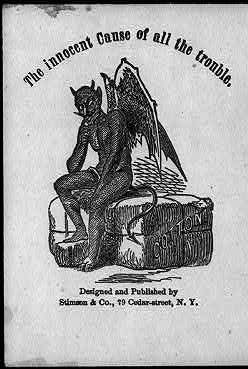
The Innocent Cause of all the Trouble, illustration of the Devil sitting on a bale of cotton, illustration circa 1861-65
Georgia’s declaration focuses heavily on slavery and state’s rights, stating that it refused to be ruled over by an anti-slavery government:
“Our Northern confederates, after a full and calm hearing of all the facts, after a fair warning of our purpose not to submit to the rule of the authors of all these wrongs and injuries, have by a large majority committed the Government of the United States into their hands. The people of Georgia, after an equally full and fair and deliberate hearing of the case, have declared with equal firmness that they shall not rule over them. A brief history of the rise, progress, and policy of anti-slavery and the political organization into whose hands the administration of the Federal Government has been committed will fully justify the pronounced verdict of the people of Georgia. The party of Lincoln, called the Republican party, under its present name and organization, is of recent origin. It is admitted to be an anti-slavery party. While it attracts to itself by its creed the scattered advocates of exploded political heresies, of condemned theories in political economy, the advocates of commercial restrictions, of protection, of special privileges, of waste and corruption in the administration of Government, anti-slavery is its mission and its purpose. By anti-slavery it is made a power in the state. The question of slavery was the great difficulty in the way of the formation of the Constitution.”
Mississippi’s declaration is somewhat more straightforward on the subject when it states: “Our position is thoroughly identified with the institution of slavery.” The declaration then goes on to say that the state seceded because if it didn’t it would lose its slaves:
“Utter subjugation awaits us in the Union, if we should consent longer to remain in it. It is not a matter of choice, but of necessity. We must either submit to degradation, and to the loss of property worth four billions of money, or we must secede from the Union framed by our fathers, to secure this as well as every other species of property. For far less cause than this, our fathers separated from the Crown of England.”
South Carolina’s declaration also mentioned state’s rights and suggested the federal government’s actions towards slavery were a violation of the Constitution:
“The people of the State of South Carolina, in Convention assembled, on the 26th day of April, A.D., 1852, declared that the frequent violations of the Constitution of the United States, by the Federal Government, and its encroachments upon the reserved rights of the States, fully justified this State in then withdrawing from the Federal Union; but in deference to the opinions and wishes of the other slaveholding States, she forbore at that time to exercise this right.”
Texas’s declaration also mentions slavery and states rights but also discusses other grievances with the federal government, accusing it of failing to protect the state from Native American attacks and failing to do enough about Mexican immigration.
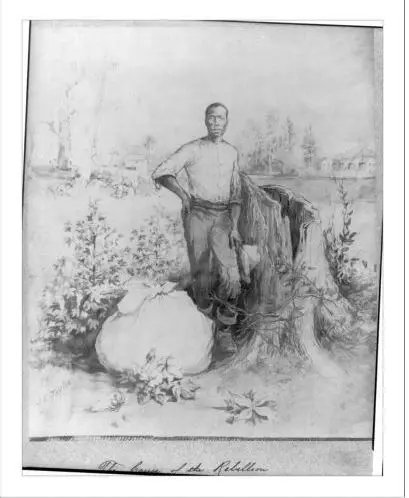
Caption card titled “Cause of the Rebellion – Nigger and Cotton,” illustration by J.E. Taylor, circa 1861-1865
Another primary source pertaining to this topic is Abraham Lincoln’s famous Gettysburg Address. According to the book Lincoln at Gettysburg: The Words that Remade America by Garry Wills, in the speech, Lincoln argues that the Civil War is a battle for equal rights for African-Americans, particularly in his opening line:
“Fourscore and seven years ago our fathers brought forth on this continent a new nation, conceived in liberty and dedicated to the proposition that all men are created equal. Now we are engaged in a great civil war, testing whether that nation or any nation so conceived and so dedicated can long endure.”
Furthermore, Wills says that this speech eventually paved the way for the 14th amendment, which granted citizenship to former slaves.
Many primary sources of the time back up Wills claims. A number of newspapers picked up on the message of Lincoln’s speech and criticized the president for his bold assertion, such as The Chicago Times, which wrote:
“How dare he, then, standing on their [the soldiers] graves, misstate the cause for which they died, and libel the statesmen who founded the government? They were men possessing too much self-respect to declare that Negroes were their equals, or were entitled to equal privileges.”
However, we don’t know if Lincoln actually felt this way or if he was just hoping to gain support for the Union cause by equating the war with a noble struggle for human rights.
Another famous Civil War-era speech that states slavery was the cause of the Civil War was the “Cornerstone Speech” by Alexander Stephens, the Confederate Vice President. Stephens spoke in Savannah, Georgia in March of 1861, just weeks before the war officially started, during which he compared the Civil War to the Revolutionary War, in which a band of rebels overthrew a tyrannical government, and said that slavery was the cause of this new revolution:
“The new constitution has put at rest, forever, all the agitating questions relating to our peculiar institution African slavery as it exists amongst us the proper status of the negro in our form of civilization. This was the immediate cause of the late rupture and present revolution.”
Another useful primary source on the topic is the memoir of the Confederate President, Jefferson Davis, titled The Rise and Fall of the Confederate Government. In the preface of his memoir, Davis wrote that slavery, which he referred to as “African servitude,” was one of the main reasons for the Civil War:
“African servitude at that time was not confined to a section, but was numerically greater in the South than in the North, with a tendency to its continuance in the former and cessation in the latter. It therefore thus early presents itself as a disturbing element, and the provisions of the Constitution, which were known to be necessary for its adoption, bound all the states to recognize and protect that species of property. When at a subsequent period there arose in the Northern states an anti-slavery agitation, it was a harmless and scarcely noticed movement until political demagogues seized upon it as a means to acquire power. Had it been left to pseudo-philanthropists and fanatics, most zealous where least informed, it never could have shaken the foundations of the Union and have incited one section to carry fire and sword to the other.”
Why Was Slavery a Cause of the Civil War?
A common belief is that it was the dispute about the morality of slavery that caused the southern states to secede but in reality, it was the economic and political issues of slavery that really played a part in the outbreak of the war.
Slavery was important to the south because the southern economy, which was an agricultural-based economy whose biggest exports were cotton and tobacco, depended on slaves for labor. Southerners argued that ending slavery would devastate the southern economy.
The southern states wanted to assert their state’s rights over the federal government so they could abolish or ignore federal laws about slavery that they didn’t support.
In addition, the south wanted slave states to expand into the west while the north wanted to make western states free states.
The Republican party was opposed to westward expansion of slavery into these new states and when Abraham Lincoln, who was a member of the Republican party, won the 1860 election, the southern states saw this as a major loss to their cause.
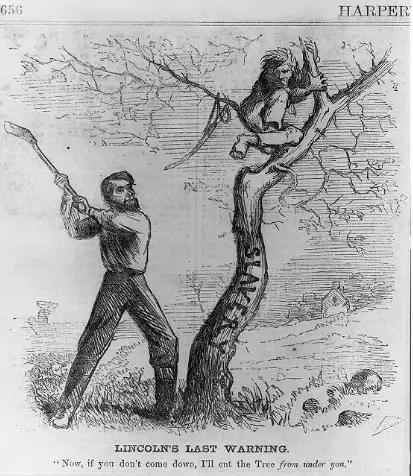
Lincoln’s Last Warning [Pres. Lincoln about to cut down tree (slavery) – warning a man to come down from the tree], illustration published in Harper’s Weekly, circa 1862
South Carolina seceded December 20, 1860
Mississippi seceded January 9, 1861
Florida seceded January 10, 1861
Alabama seceded January 11, 1861
Georgia seceded January 19, 1861
Louisiana seceded January 26, 1861
Texas seceded March 2, 1861
Virginia seceded April 17, 1861
Arkansas seceded May 6, 1861
North Carolina seceded May 20, 1861
Tennessee seceded June 8, 1861
After South Carolina seceded in December of 1860, it demanded that the United States abandon its military forts in Charleston Harbor and then, in April of 1861, attacked and overtook Fort Sumter, an event which kick started the Civil War.
Americans Are Still Divided on the Cause of the Civil War:
The debate about whether slavery was the cause of the Civil War still continues today. In 2011, a Pew Research Center poll found that Americans are still divided on this question with 48% saying the war was “Mainly about state’s rights,” while 38% said it was “Mainly about slavery” and 9% said it was about both equally. The remaining 6% said it was neither or they didn’t know.
Another poll conducted in 2011, the CNN/Opinion Research Poll, found that 52% of respondents polled said that slavery was the main reason why the southern states seceded while 42 percent said it was not the main reason.
Yet, a Harris poll conducted in January of 2011 found that 54% of the respondents polled felt that the south was fighting for state’s rights and 69% felt the north was fighting to preserve the Union rather than to abolish slavery.
Another study conducted in 2015, the McClatchy-Marist Poll found that 54% of respondents said slavery was the main reason for the Civil War while 41% percent said it was not the main reason and 6% didn’t know.
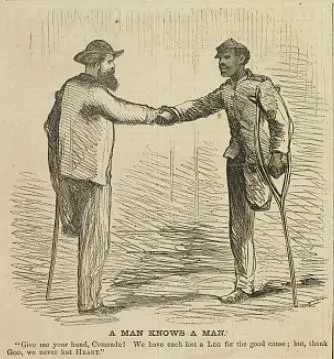
“A Man Knows a Man, Give me your hand, comrade! We have each lost a leg for a good cause; but, thank God, we never lost heart,” illustration published in Harper’s Weekly, circa April 1865
In addition, these responses in the McClatchy-Marist poll varied by region. In each geographical region except for the south, respondents said that slavery was the main reason for the Civil War. According to the poll, the southerners polled were divided on the issue with between 45-49% of them saying slavery was not the main cause.
Either way, it appears that the debate about what caused the Civil War isn’t over yet and probably won’t be anytime soon.
Sources:
The Rise and Fall of the Confederate Government by Jefferson Davis
Lincoln at Gettysburg: The Words that Remade America by Garry Wills
BBC; US Civil War 150th Anniversary: How US Remains Divided; April 2011: bbc.com/news/world-us-canada-13040351
CNN; Civil War Still Divides Americans; April 2011: politicalticker.blogs.cnn.com/2011/04/12/civil-war-still-divides-americans/
NPR; Slavery Not State’s Rights Caused Civil War Whose Political Effects Linger; Frank James; April 2011: npr.org/sections/itsallpolitics/2011/04/12/135353655/slavery-not-states-rights-was-civil-wars-cause
McClathy DC Bureau: Did Slavery Cause the Civil War? Many Americans Don’t Think So; August 2015: mcclatchydc.com/news/politics-government/article30101748.html
Pew Research Center; Civil War at 150; Still Relevant Still Divisive; July 2013
people-press.org/2011/04/08/civil-war-at-150-still-relevant-still-divisive/4-8-11-1/
Tracing Center: What Does the Gettysburg Address Tell Us About the North and Slavery?: tracingcenter.org/blog/2013/11/what-does-the-gettysburg-address-tell-us-about-the-north-and-slavery/
PBS; History Detectives; Causes of the Civil War: pbs.org/opb/historydetectives/feature/causes-of-the-civil-war/
National Park Service: Slavery: Cause and Catalyst of the Civil War: nps.gov/fosu/learn/historyculture/upload/SLAVERY-BROCHURE.pdf
Yale Law School: Gettysburg Address: avalon.law.yale.edu/19th_century/gettyb.asp
Civil War Trust: The Declaration of Causes of Seceding States: civilwar.org/education/history/primarysources/declarationofcauses.html
The Civil War Trust: The Reasons for Secession: civilwar.org/education/history/secession/

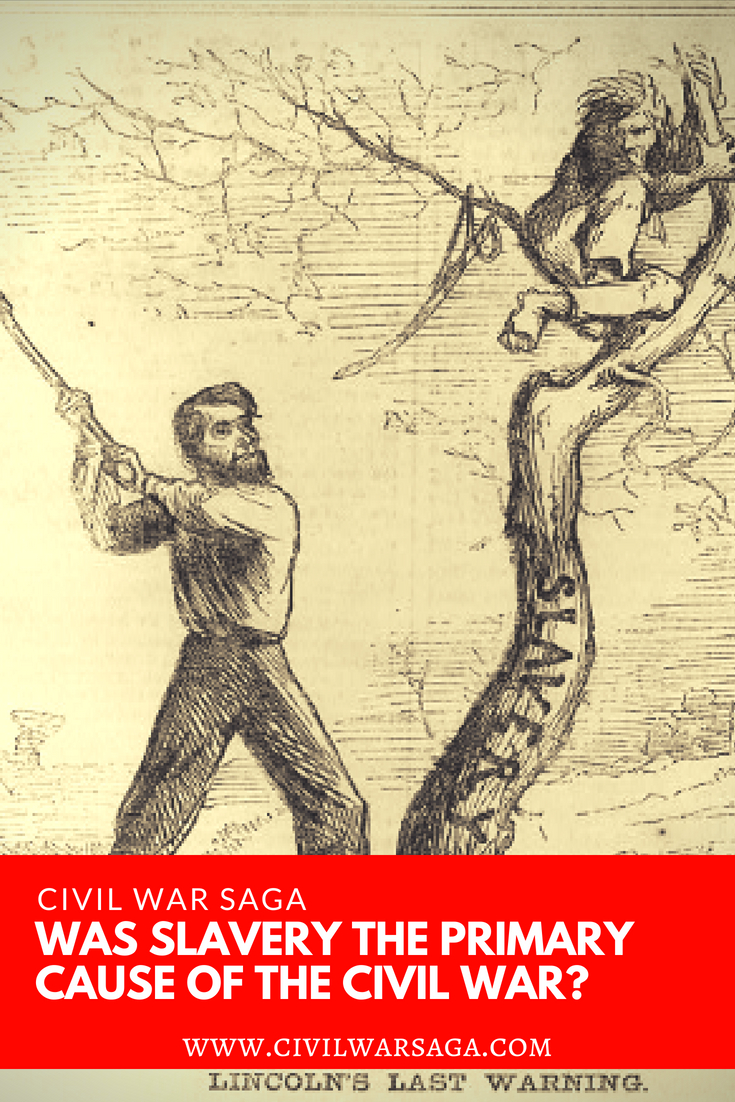
Also slavery didn’t cause the war, it caused secession , that and state sovereignty and other issues all caused secession. It was mainly over state sovereignty but slavery was tied to it . but secession isn’t war, so no slavery did not cause the war, slavery was constitutional. What caused the war was Lincoln sending troops to collect revenue, had nothing to do with slavery, the war would have never happened if Lincoln didn’t reject secession, he wanted to collect taxes. Lincoln is the one who wanted to fight to preserve the union, the south didn’t want to fight at all but to peacefully leave , they would only fight if they had to for there independence, that’s what the war was over, nothing else . Secession doesn’t always cause a war, secession isn’t war, they didn’t go to war over slavery, and the north didn’t go to war over slavery either , there went to war to collect revenue . Your confusing the reasons of secession , with the reasons of the war. Secession isn’t war, yes the south seceded to govern itself and yes slavery was part of it. but , no one declared a war over slavery, they might have argued about the people issues around slavery, but non declared a war over it,, if the south simply freed all elves the war would still continue unless they rejoined the union. That goes to show you it wasn’t over slavery. The corwin amendment is another reason to show you it wasn’t over slavery.. yes slavery was a issue heard by the north as mentioned in secession, yes the north did brake state sovereignty by using slavery as the reason to do so, they used slavery as a reason to strengthen there Hamiltonian state goveent, they used slavery as a reason to exclude the south and any Jeffersonian state.
The arguement of slavery caused most of the problems that built up to secession , but the war started after secession , declaring independence is not declaring war! Lincoln declared war illegally ! By why?? To collect revenue ! And in order to do that he must bring them back into the union and if it meant killing people well he would do it! So stop asking if slavery was a issue , of course it was,, but start asking , why did the war have to go on or have to start in the beginning ? Why Couldn’t Lincoln just let the south peacefully ?? Was it over slavery ? No it was not!
The southern states (all 11 states) where making billions of dollars off the backs of African slaves. Southerns planters did not want to give up the luxury of owning slaves. President Lincoln offered planters money for exchange of letting the slaves go. The planters refused the money. (Read about Lincoln)
Those 11 southern states knew their only resources were cotton and tobacco. Who wants to give up free labor and the privilege of getting rich.
The information above is amazing, I would like to purchase a book if available.
Thanks for the great work. This will for sure help me on my debate.